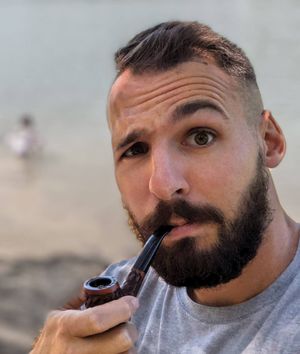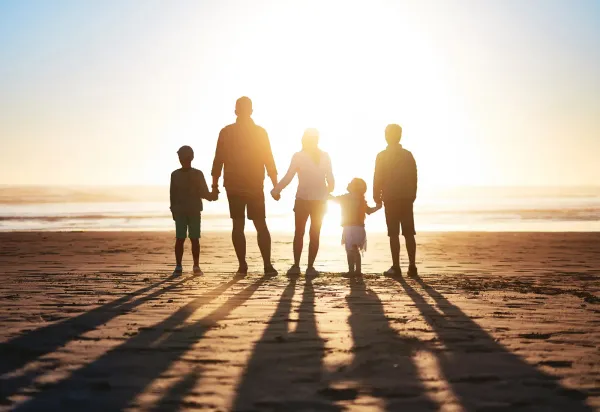A Miscarriage
The heart rate was too low, the doctor told us, and the weight gain not significant enough.
These were bad signs, indicators, and precursors. Still, we held onto that foreign benign hope that accompanies the ill-experienced and the young. The doctors and nurses were artisans and experts with their linguistic evasiveness. Nothing is definitive. That is, not until it must be.
A late-stage miscarriage, the attending told us.
The Sonographer, a young woman a year or two out of school, had those fresh eyes, like us, eyes that had not yet born the necessary hardships to navigate this delicate form of communication. The back-and-forth of vagaries. After she finished scanning and drawing measurements and rolling that little circular ball — the typing of letters as rhythmic and medicinal as the menthol-scented ultrasound gel that clung to the air — she left momentarily to fetch the attending. The doctor’s eyes were sharp and quick with discernment. The sonographer kept her gaze low, glancing between my wife, the screen, and the tiled floor.
Our first two visits were different in every way. A lofty dream-like haze of optimism and newness. We were going to be parents. The miracle of life. The scans were filled with chatter and excitement, platitudes and plans — should we wait to find out the gender, who should we tell first, should we set up a registry, what colors should we decorate the nursery?
A name. If it was a boy? A girl? A juxtaposition of hers and mine or a revered relative? Something strong and bold, like him or her, we would tell them as we recalled the harrowing events of the birthing day.
The third visit, this one, was different. A truer juxtaposition of names: life and loss; probability and reality. An egg-white room with soft accents and cheerful pictures of empty beaches, plated fruits, and drifting birds against a rebellion of hopefulness and helplessness. The chatter that helped pass the time gave way to furrowed brows and a quiet flexed consternation. The sonographer’s aversion to questions about the future of our child was obvious enough. The statistical likelihood was high, guaranteed. An outcome that would not be outrun or outmaneuvered.
A diagnosis that compressed the blind encouragement offered up by those close to us, every single “everything will work out, I just know it,” and each disillusioned gift of false hope.
We felt those lies heavier, still than if they had never been offered.
In our anger, we couldn’t fault them for their empty uplifting; hope and assurance are a reward only to the ones giving it, rarely to those receiving it. It is negligent and irrespective of truth and outcome. It lowers defenses when shields should be high and turns eyes when they should be vigilant.
Naivety and innocence replaced with something viscous and murky and hard, a resilience found among those who know too much about life.
False Hope Is Provocative
But like any other hope, it is scattered on the stones of reality where exists only truth.
We had three options facing us. Let the miscarriage run its natural course and allow her body to push the now deceased child from its former home, take a pill to induce the miscarriage, or perform a surgical D and C.
We chose the first option. We reasoned that our baby came into this world peacefully and naturally and so we would let it leave peacefully and naturally. We prayed that as the tears flowed easily from our eyes, so too would our little one pass from us.
Several weeks passed but the fetus still had not. We were broken. I was broken knowing I could do nothing. Every day, my wife woke up, went to work, lived her life, smiled, cried, laughed, and prayed. Every day, she put on the mask to show the world she was okay. But behind that mask were dried tears and sleepless eyes.
Every day, she carried around the lifeless body of her child. Our baby.
At the follow-up, we were told the child would not likely pass on its own. So, we opted for the pill. A medically induced abortion would be the official description. It was not a phrase we let dwell in our minds for long, nor something we spoke of often.
A Pill and a Surgery.
Twenty-four hours of torturous cramping and pains. Fever and chills followed by bouts of lightheadedness and fatigue. It all ends with a trip to the bathroom. You whisper goodbye to your child as you stare at the bloody mess of clots and fluids looking up at you from the toilet. A flush and a wash of the hands and that’s it. The shallow breathing and low sobs are covered by the cycling of city water as that last whispered goodbye is sucked into the ducts and churned up in wastewater treatment downtown. With each gurgle of water another sun-flared tire-swing family photo cracks.
The best memories are the ones you pray will come.
A remnant remained though and, like a clinging nightmare, the pain of this pregnancy continued. After exhausting the first two options we were told that a D and C would be required to remove the last bits of the pregnancy. So off we went. She was in surgery for 2 hours while I waited, nervous but calm, in the holding room.
I smiled at the other patrons in the waiting area. Empty faces and blank expressions side-by-side. Hopeless nervous twitchers beside the relieved and the expectant; a melting pot of fear and joy. Each person coped as best they knew, some better than others, some louder than others. It’s in these moments that the fabric of man becomes ruffled and frayed, unraveling one stitched string at a time.
The Morning After
Is always the hardest, in the way that grief is formless and distant; like finding words when there are none or giving a physical description of something phantom; a past that lingers and a future without shape.
The birds chirp their sweet melodies as they always do. The wind is calm and the grass is wet. The rest of the world wakes to its morning routine; a seemingly normal day, each person minding their own business, friends and acquaintances crossing paths oblivious to one another, loved ones honking at former lovers, and friends of friends and third cousins brushing shoulders on the busy streets.
It becomes apparent how far apart we exist despite our proximity.
The bed sheets curl and wrinkle the same as they had for the last 7 years; familiarity layering the contrast in a way that seemed both proper and not — an inappropriate meeting of things that never should.
Quiet sobs from the other side of the bed bring back the hard truths of the previous night. The reality of dreams lost and a life shattered. The remnant of comfort given by sleep and a warm bed washed cold in a quiet storm of reality. As I inhaled a deep breath, another stifled sob crushed the fragmented remains of my soul, a storm of its own. I shimmied my way through the sheets and embraced my crying wife. I doubt she had gotten any sleep that night. It felt wrong that I had; that I should wake from a restful sleep in a time of agony and broken coping.
It was the first of many mornings, all the same. Each infinitesimally easier than the last, though, that pain would visit us at odd times and the cycle would start over again. A new morning, another first.
The wound inside my wife would heal. We would move, furniture would change, jobs would be acquired and lost; we would make new friends and drift away from old ones, and life would molt and shed away previous versions of us for ones more circumspect and mature.
Until one day years later, and on rare occasions, when the tears have been shed and the nights stilled, it comes up over coffee in a quiet back patio as the sun sets on a field of memories and perfect moments, where locked things are loosed and hearts are made vulnerable.
A Melody.
In trauma we become raw or we become numb. My wife became raw, I became numb.
I loved what that child was going to be. I loved it so hard, so absolutely, as a father should. I dreamed of the photo-filled music ensemble and the soft ballads to accompany lazy Saturdays and sunlit fields of grass and laughter. It was a pain I had never experienced before, one that I had never learned to articulate much less cope with.
So I buried it deep within me, in a chest with embroidered gems and soft lines of gold and a black lock with an iron latch, for those who expected me to be strong, for those who needed me to hear their encouragement, and for myself because I never learned how to mourn or to cry. I punched the air and I screamed and fought and rebelled. Always on the inside where darkness lurks, in deep trenches beneath still water.
I would stare at nothing and dream angrily, but most often I would dream nothing at all. I would smile when it was appropriate, argue when a point needed to be made, listen to friends, joke with family, and seamlessly partition my pain from my life.
This is what we do until we are ready to move on.
We take it on the chin because we have to. In the way a mother must undergo the pain of labor as a natural part of that process, of that life-giving, so too must we walk under those still arbors, wrapped in vines and lattice, bearing the pain that is loss, that is life-taking.
We embraced this muted part of our lives, a new song in writing.
It was quiet so we sat in it, alone. With our hearts, we felt and with our pain, we saw. And in its hushed tones, low hums, and soft embouchure we heard it, that melody. In the discords of mismatched fifths, we listened to the disharmonies with zeal. We smiled at their ploys and their dissonance, we cried when the minors flowered and the chorus grew, and we shifted uncomfortably with the echoes and discants.
We let that song rise and fall over a time that only we could deem appropriate until we were confident that we had been seen, not by others, but within ourselves; until we knew that song like an old friend, its every intonation; until it became familiar.
And so it comes naturally in conversation now. Occasionally offered up, a creaking of that chest with a black lock and iron latch, given to those that might need to share in the pain, who are walking the same lonely march we sojourned. And in passing when we talk about our two daughters.
Our first was a miscarriage but 2 years later we had Gia, and 17 months after, Cece.
It becomes a word in a sentence, a story wrapped in a story but masked intentionally. One we would rarely tell. Because only those who know it will understand it. To anyone else, it’s just a miscarriage.
A new melody we sing, now. It’s mostly happy, filled with many wonders and many smiles. But in the back, if you listen closely, you’ll hear the quietness of a soft sad instrument whose notes are painful and flawed but full, always, and every bit belonging. A remnant of an old melody, I suppose, which, itself, was but an image in distortion of something even older, more archaic than it.
A journey, sometimes, requires steps we wish never to take. But always still, we march on singing to life’s many vibrant and somber tunes, forever a melody in change.
Cheers, folks.
This article was originally published at Medium. Republished with permission from the author.











Member discussion